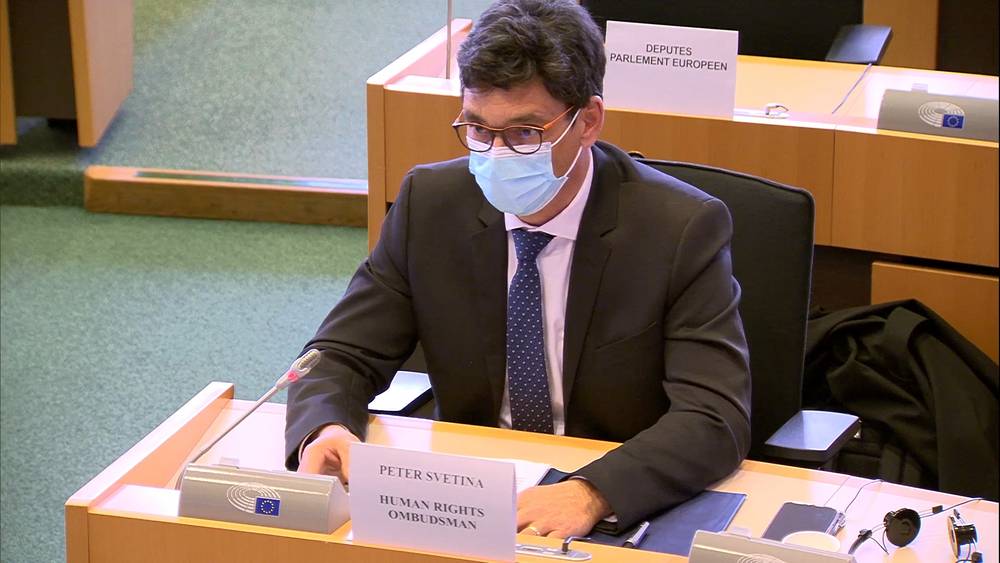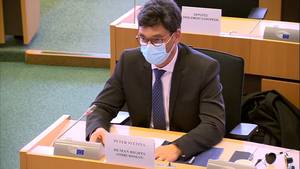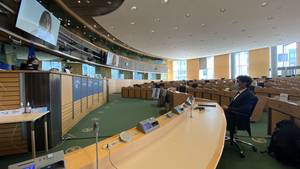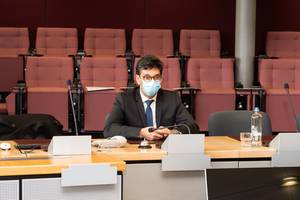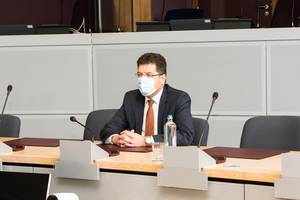Skupina Evropskega parlamenta za spremljanje spoštovanja demokracije, pravne države in temeljnih pravic, ki deluje v okviru parlamentarnega odbora za državljanske svoboščine, pravosodje in notranje zadeve (LIBE) je 26. marca 2021 nadaljevala razpravo o svobodi medijev in vladavini prava v Sloveniji. Varuh človekovih pravic Peter Svetina je sprejel povabilo te skupine, ki jo vodi evropska poslanka iz Nizozemske Sophie in 't Veld, in se je neposredno v Bruslju udeležil drugega kroga razprave.
V svojem govoru na popoldanskem panelu je standard spoštovanja človekovih pravic v Sloveniji ocenil kot relativno dober, poudaril pa je, da ni v vseh pogledih tako, kot bi moralo biti, ali morda celo, da do kršitev človekovih pravic sploh ne prihaja. »Lani je bilo neimplementiranih še 13 odločitev slovenskega ustavnega sodišča. Nekaj teh zadev se vleče tudi po več let in so 'preživele' različne vlade brez, da bi ena ali druga pripravila potrebne spremembe zakonodaje. Tak primer je npr. Zakon o duševnem zdravju, ki ga je izpodbijal prav Varuh človekovih pravic, rok za odpravo ugotovljene protiustavnosti, ki ga je določilo Ustavno sodišče pa se je iztekel že pred več leti,« je poudaril varuh.
»V zvezi z Evropskim sodiščem za človekove pravice lahko izpostavim, da je bilo na to sodišče doslej, t. j. med leti 1993-2019, proti Sloveniji vloženih 9.722 pritožb, pri čemer jih je bilo za pritožnike uspešnih 3,48 odstotkov. Pozitivno je, da je do sedaj Slovenija izvršila vse razen osem sodb,« je v delu o vladavini prava poudaril varuh. »V vsakem primeru je več področij, kjer je treba narediti korak naprej, da bi omenjeni relativno dober standard lahko občutil vsakdo v slovenski družbi in da nobena ranljiva družbena skupina ne bi bila izključena ali kakor koli prikrajšana,« je dodal.
»V zadnjem letu je soočanje s pandemijo koronavirusne bolezni, ki pogosto terja hitro sprejemanje ukrepov s strani oblasti, prineslo številne omejitve človekovih pravic in temeljnih svoboščin. Te so lahko legitimne, lahko pa tudi ne, če ne upoštevajo načel nujnosti ukrepov, sorazmernosti, nediskriminacije, časovne omejenosti, strokovne utemeljenosti in zakonitosti,« je povedal varuh in dodal, da je institucija Varuha lani obravnavala preko 4.800 zadev in v primerjavi z letom poprej zabeležila več kot 30 odstoten porast zadev, s katerimi so se ljudje obračali na Varuha.
Skrbi ga, ker ni ukrepov za izboljšanje pogojev dela, organizacijo poslovanja ter materialni položaj sodnikov in nekaterih skupin zaposlenih, pa tudi podatki iz tožilskih vrst, da prihaja do nedovoljenih pritiskov na njih. Zapleti pri imenovanju tožilcev pa imajo po njegovem mnenju lahko konkretne posledice pri organizaciji dela, ob siceršnjem kadrovskem primanjkljaju v tožilskih vrstah. »Postopki se morajo izvesti po obstoječih merilih brez nepotrebnih odlašanj, morebitne pomanjkljivosti v dosedanji ureditvi pa čim prej odpraviti,« je opozoril varuh Svetina.
V delu o svobodi medijev je varuh poudaril, »da sta oba javna servisa, to sta Radiotelevizija Slovenija in Slovenska tiskovna agencija potrebna posebne pozornosti in ne smeta biti talec oziroma plen vsakokratnih zmagovalcev volitev. Dostop do verodostojnega informacijskega novičarskega servisa je človekova pravica in podstat demokratičnosti.«
»Glede zadnjih zapletov, ki se nanašajo na financiranje Slovenske tiskovne agencije sem zaskrbljen nad neizvajanjem obstoječe zakonodaje. Podobno kot sem omenil glede imenovanja tožilcev menim, da se postopki financiranja morajo izvesti po obstoječih merilih brez nepotrebnih odlašanj, morebitne pomanjkljivosti v dosedanji ureditvi pa ustrezno odpraviti,« je opozoril varuh.
»Za spodbujanje neodvisnega novinarstva treba občutno zmanjšati delež prekarno zaposlenih in poiskati trajnejše ter varnejše oblike zaposlovanja novinarjev,« meni varuh. »Prevladati mora zavedanje, da so novinarji pomemben steber demokratične družbe in da so vsi pritiski nanje nedopustni. In to na vse novinarje. Ne glede na njihov svetovni nazor,« dodaja varuh. Varuh tudi meni, da se dejansko dosojene odškodnine za poseg z medijskimi objavami zdijo prenizke, da bi lahko delovale odvračalno na vse bolj senzacionalistično usmerjene in populistične medije. »Nujen pa je tudi ustrezen pregon sovražnega govora v javnem prostoru, ne glede na to, kdo je njegov avtor, ne sme pa seveda nesorazmerno posegati v svobodo govora,« opozarja varuh.
Ob robu razprave se je varuh človekovih pravic Peter Svetina v Berlaymontu srečal tudi z evropskim komisarjem Janezom Lenarčičem, pristojnim za krizno upravljanje in veleposlanikom pri Stalnem predstavništvu Republike Slovenije pri Evropski uniji Iztokom Jarcem. Varuh se je komisarju Lenarčiču zahvalil za njegovo delo na področju humanitarne in civilne zaščite, ki je nepogrešljivo tudi v času pandemije. Seznanil ga je s splošnim stanjem človekovih pravic v Sloveniji in delom institucije Varuha človekovih pravic. O tem se je varuh pogovarjal tudi z veleposlanikom Iztokom Jarcem, v okviru njunega srečanja na Stalnem predstavništvu Republike Slovenije pri Evropski uniji.
